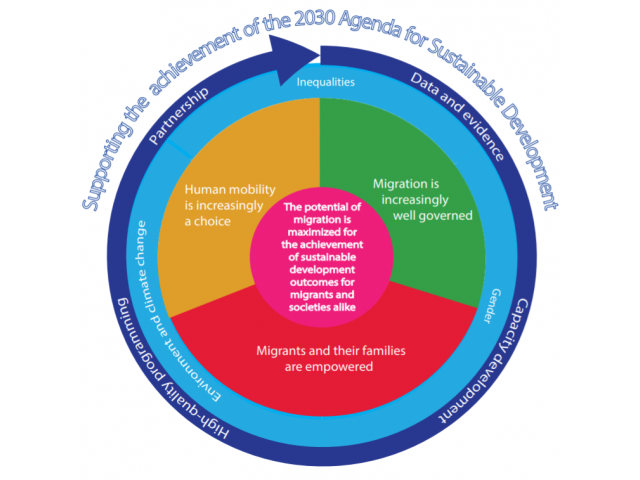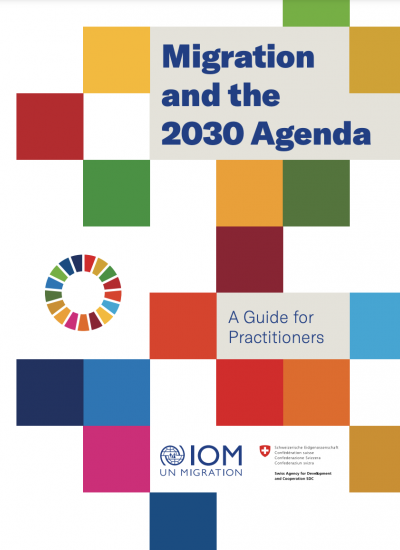Why Migration and Sustainable Development (M&SD)
Migrants can help build stronger, more inclusive and resilient communities through the knowledge, networks and skills that they bring to their communities. Shaping our world at every turn, migration is a global phenomenon that touches us all. We are all reliant – for our health, our food, and our economy – on the safe, orderly and regular movement of people.
Indeed, migrants and displaced people should be able to access their rights and essential services without fear of discrimination, racism or violence - enabling them to escape poverty, support their families and contribute fully to a cohesive and developing society. For example, migrants who move through regular channels and have full identification are more able to access decent work and livelihood opportunities. Better educated migrants, refugees and their families can more effectively reach their full potential as innovators and leaders. Migrant workers empowered to move in a safe, orderly and regular manner are able to meet global labour demand and contribute to sustainable and inclusive economies.
At the same time, global challenges such as COVID-19 and climate change have also demonstrated that when pathways for safe migration are limited, our communities can suffer, putting our global progress towards prosperous and healthy societies (what is often termed “sustainable development”) at risk. Sustainable development means progress for all, not only some, and to do this, we must create equal societies that are inclusive of migrants, regardless of their status.
IOM's Role
The International Organization for Migration (IOM) is the leading inter-governmental, UN-related organization in the field of migration and works closely with governmental, intergovernmental and non-governmental partners. IOM is dedicated to promoting humane and orderly migration for the benefit of all. Check out our page on the IOM website.
IOM is a development agency; in fact, it is one of the top 10 international organizations by development assistance expenditure (31% of IOM's 2021 expenses was development assistance, growing from 29% in 2020). IOM joined the UN System in September 2016, and it is also a core member of the UN Development System (UNDS) as evidenced by its membership to the UN Sustainable Development Group.
IOM works to ensure that the UN System's activities maximize migration's potential for sustainable development, including through its role as coordinator and secretariat of the UN Network on Migration (UNNM). The UNNM was established by the UN to ensure timely and coordinated support to Member States to implement, follow-up and review the GCM.
IOM’s contribution to the 2030 Agenda for Sustainable Development is elaborated in IOM’s Institutional Strategy on Migration and Sustainable Development (M&SD Strategy).
The Migration and Development Strategy and its Action Plan represent IOM's direct contribution to the Sustainable Development Goals. It supports IOM's active participation in the UNDS and builds on stronger partnerships within and outside the UN system.
The M&SD Strategy recognizes that migration, when well-managed, can be both an outcome of development and a development. By identifying concrete outcomes, IOM works towards a future of good migration governance that results in sustainable development for all. [Click on the image on the right to see them in detail.]
IOM works to make human mobility a choice by addressing the structural factors that force people to move and by improving safe and regular migration routes; to empower migrants and their families as agents of change by protecting migrants' rights and advocating for long-term solutions for both displaced persons and hosts; and to better regulate migration by promoting coherent migration and development systems and institutions, in line with the GCM and the 2030 Agenda.
M4D Net: Enabling us to Achieve M&SD
IOM’s goal is to work with our Member States and other stakeholders to enhance migrants’ capacities to contribute to sustainable development for all. For this reason, the M4D Net was created over ten years ago to serve as a global hub for migration and sustainable development (M&SD), bringing together migration practitioners and policymakers from around the world.
On the M4D Net, we share and disseminate good practices, achievements and knowledge gained from practical experience leveraging migration for the 2030 Agenda, so that all practitioners can benefit, and migrants can be at the heart of our global progress towards sustainable development.
The M4D Net is a legacy of an earlier site established through the Joint Migration and Development Initiative (JMDI), an inter-agency UN programme spanning over a decade that worked in several countries.
- Migration for Sustainable Development: An interactive platform visually showcasing the linkages between migration, the SDGs and development sectors.
- Integrating Migration: For practitioners to learn some key ideas to help integrate migration into their work: local/national governments, UN Development System, Development Cooperation Actors and COVID-19 socio-economic recovery.
- 4 Steps for Implementing Migration for the SDG: A roadmap to guide you to include migration in national and local government development plans and processes.
- Build your network in our community of practice
- Find the latest resources and tools
- Be inspired by innovative M&SD projects
- Learn new skills through e-learning courses
- Find the right person for your M&SD job and career opportunities
- Share information and ideas in events and workshops
- Hear about the latest innovation on M&SD at the country and local levels in our Programmes
- IOM-UNDP Global Programme on Making Migration Work for Sustainable Development (M4SD)
- Mainstreaming Migration into International Cooperation and Development (MMICD)
- Showcase your successes and good practices by uploading to our resources, projects, events and more.
Global Engagement on M&SD
Maximizing the benefits of migration requires a comprehensive approach that ensures no one is left behind, while also leveraging migrants’ capabilities as contributors to sustainable development and agents of change in their communities. Migrants have a critical role to help fullfil the promises of the 2030 Agenda for Sustainable Development and the Sustainable Development Goals (SDGs), which present our global roadmap for achieving a fairer, safer and more inclusive society by 2030.
While the Sustainable Development Goals' central reference to migration is Target 10.7 on facilitating “orderly, safe, regular and responsible migration” (SDG 10: Reduced Inequalities), migration relates to all SDGs and the commitment to “leave no one behind.”
The UN has called for a Decade of Action, when we must expedite our work to achieve the SDGs. Promoting safe, orderly and regular migration and addressing displacement in line with the Global Compact for Safe, Orderly and Regular Migration (GCM) can help us do this. The GCM is anchored in the 2030 Agenda, and its guiding principles and 23 Objectives are our roadmap to achieve the migration-dimensions of the SDGs.
Sustainable development is recognized as one of the core Guiding Principles of the GCM (Guiding Principle on Sustainable Development) and leveraging migrants’ contributions to development is also a concrete objective of the GCM (Objective 19: Migrant and Diaspora Contributions). See the UN Network for Migration and the Migration Network Hub for more information.
The global community has come a long way in recognizing and empowering migrants as development actors. The Global Forum on Migration and Development (GFMD) was launched in 2006, and has since acted as a State-led, informal and non-binding process to help shape the global debate on migration and development.
Read more about IOM’s involvement here.
Cities and local authorities are increasingly key actors in global migration and displacement dialogues such as the GFMD (originally through the Mayoral Forum) and most recently through the establishment in 2018 of the Mayors Mechanism (MM). The MM creates opportunities for local and regional governments to take part in global migration governance and engage in peer-to-peer learning and exchange. It is a prime model of a partnership and collaboration space, forging links between States, cities and local/regional governments as well as civil society, the private sector, the UN system and other international and regional organizations.
The Mayors Mechanism supported the Marrakech Mayors Declaration "Cities Working Together for Migrants and Refugees," which has been adopted by over 76 mayors and city leaders since 2018. Cities made commitments to the implementation of both the Global Compact for Safe, Orderly and Regular Migration and Global Compact on Refugees.
The Mayors Mechanism launched a Call to Local Action for Migrants and Refugees in 2022 which invites local and regional governments to share knowledge, create partnerships and upscale good practices in support of the Compacts to continue to engage local authorities as essential partners in our quest for sustainable development inclusive of mobility. Read the 70+ local actions already submitted and join the global effort.
Migration – The movement of persons away from their place of usual residence, either across an international border or within a State. We use the term migration on this site to refer to all forms of mobility - including labour migration, forced displacement, internal displacement, short term mobility such as international student mobility, etc. For the full definition, see IOM's Glossary on Migration.
Sustainable development – Development that meets the needs of the present without compromising the ability of future generations to meet their own needs.
Sustainable Development Goals (SDGs) – 17 Goals which represent a universal call to action to end poverty, protect the planet and improve the lives and prospects of everyone, everywhere. The Goals were adopted by all UN Member States in 2015 with 15-year plan to achieve them by 2030.

